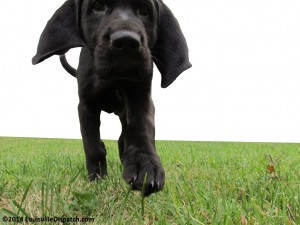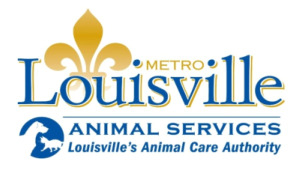 As people make preparations for Fourth of July celebrations, Louisville Metro Animal Services asks that you keep your pets in mind. Each year, pets across the country find their way into shelters during this festive time. While many look forward to the traditional celebratory sights and sounds of fireworks glowing and booming across the sky, this can be a scary experience for pets.
As people make preparations for Fourth of July celebrations, Louisville Metro Animal Services asks that you keep your pets in mind. Each year, pets across the country find their way into shelters during this festive time. While many look forward to the traditional celebratory sights and sounds of fireworks glowing and booming across the sky, this can be a scary experience for pets.
Louisville Metro Animal Services is bracing for an influx of stray animals to hit the streets of Jefferson County. The loud noises associated with this holiday weekend often result in a spike in stray animals. When dogs experience a large amount of fear and anxiety at once, their initial response is to retreat. However, there are some preventative measures you can take to protect your pet(s) and keep them feeling safe.
- Leave pets inside
- Close all windows and curtains to muffle the sound of fireworks, and always provide plenty of food and water. Turning on a radio, television or fan also may help calm your pet. For pets who experience severe anxiety, owners may want to consult their veterinarian about prescribing a mild sedative to ease the pets’ stress. Owners who are leaving town for the holiday should consider boarding their pets.
- Leave pets at home during firework displays
- Animals have a heightened sense of hearing. The loud “booming” noise can be deafening and cause pets to panic and want to hide. Take pets for quiet walks before the festivities begin or after they end.
- Distract distressed or anxious pets
- If pets exhibit uncharacteristic behaviors, such as incessant pacing, crying or whining, owners should help distract them through play or another enjoyable pet activity. There are several products designed to help reduce anxiety in dogs, such as relaxing music and snug calming vests.
- Make sure pets are wearing collars with identification tags at all times
- This even applies to pets who only live indoors. The ID tag should include the owner’s current address and phone number. Microchipping is also important, in case pet’s collars or tags are lost.
- Keep pets away from alcohol
- Alcohol is extremely dangerous to dogs. Small amounts of alcohol can cause your dog to become dangerously intoxicated, go into a coma, or in severe cases, die from respiratory failure. Even beer is toxic. Fermented hops and ethanol are poisonous to dogs and cats.
- Clean up firework debris before letting pets outside
- If pets eat the debris, it may cause digestive problems or serious injuries. Owners should contact their veterinarian immediately if their pets have been exposed to any potentially toxic or poisonous substances.
 Councilwoman Marianne Butler is once again encouraging pet owners to take advantage of the next S.P.O.T. Clinic for residents of District 15 set for Saturday, May 20th.
Councilwoman Marianne Butler is once again encouraging pet owners to take advantage of the next S.P.O.T. Clinic for residents of District 15 set for Saturday, May 20th.
“S.P.O.T. Clinics are an effective way to provide needed veterinarian services at a low cost for pet owners,” says Butler. “If you have not had time during the week to take care of your pet, this clinic is one way to renew a license and update vaccinations.”
Here is a list of services offered at the District 15 Spring S.P.O.T. Clinic:
- 1 year rabies vaccination: $10.00
- 3 year rabies vaccination: $15.00
- DAPP: FREE!
- 1 year altered license: $10.00
- 1 year altered senior license: $5.00
- 1 year unaltered license: $60.00
- 3 year altered license: $27.00
- 3 year senior license: $13.50
- Microchip: $25.00
The S.P.O.T Clinic (which stands for Stop Pet Overpopulation Today) will be located in the front parking lot at the Salvation Army building, 1010 Beecher Street. The hours of operation are from 9:00am until 12:00pm.
For more information about the S.P.O.T. Clinic, contact Councilwoman Butler’s office at 574-1115.
Carolyn E. Congleton, DVM
Louisville Metro Animal Services
 Each summer Louisville Veterinarians treat numerous cases of heat-stroke and heat-exhaustion in pets. Unfortunately some of these cases end in pet death; sadly nearly 100 % of these cases are preventable. Most heat related deaths are in dogs and horses but sometimes cats can be victims of heat-related illness as well. In dogs the scenario is usually related to “forced exercise” or being left unattended in a car. Very rarely is a free-roaming dog victim of heat-stoke. A dog being chained outside without proper water and shade is also at risk of illness or death.
Each summer Louisville Veterinarians treat numerous cases of heat-stroke and heat-exhaustion in pets. Unfortunately some of these cases end in pet death; sadly nearly 100 % of these cases are preventable. Most heat related deaths are in dogs and horses but sometimes cats can be victims of heat-related illness as well. In dogs the scenario is usually related to “forced exercise” or being left unattended in a car. Very rarely is a free-roaming dog victim of heat-stoke. A dog being chained outside without proper water and shade is also at risk of illness or death.
Dogs should always have access to fresh water and shade or shelter at all times. A dog house with ice water inside is preferable. A large tree in the back yard is excellent shade for people and pets. Because dogs cannot sweat like people they have a hard time regulating their body temperature during exercise. If they are pulled by a leash they can’t voluntarily stop (like we humans can), they just have to keep going even though they are exhausted! If you jog with your pet do so in the early morning before extreme heat. Always watch your pooch for signs of exhaustion such as excessive panting or salivating.
The normal body temperature for a dog in the summer is 101-102 F, temperatures above 105 are in the danger zone and your pet is in trouble. If you have a hunting dog do not hunt in the heat of the day, hunting is also considered forced exercise. Never leave your dog or cat in a parked car. The temperature can skyrocket in a matter of minutes and your pooch could parish!
If you have a horse that is exercised be sure to have water available and remember there should be a “cooling-down period”. Horses transported in trailers need good ventilation and fresh water. Do not leave your horse unattended in a trailer.
For more information contact your local Veterinarian or the American Veterinary Medical Association at www.avma.org
 Since dogs and cats already have beautiful fur coats, it is easy to forget that they can suffer hypothermia, frost-bite, and other weather related injuries that people do. With the temperature dropping and lots of cold rain and/or snow already, it important to help your pet stay comfortable and safe throughout the winter season.
Since dogs and cats already have beautiful fur coats, it is easy to forget that they can suffer hypothermia, frost-bite, and other weather related injuries that people do. With the temperature dropping and lots of cold rain and/or snow already, it important to help your pet stay comfortable and safe throughout the winter season.
Here are some general tips to help you prepare for the coming cold weather:
- Puppies, kittens, and senior pets should not be left outside for any reason. Puppies and kittens are not fully developed and don’t have the ability to stand up to the colder temperatures yet. Senior pets are losing some of the natural defenses that they have and are more susceptible to the temperature as well.
- If you have outdoor cats, be cautious in starting your car. Many cats will climb under the hood of a car to stay warm. Knocking on your vehicle’s hood before you start it can let your pets know that it is time to vacate their hideout.
- Avoid shaving or cutting your pet’s hair short during the winter. If you don’t have a choice, consider purchasing a sweater for your pet. If you have a pet with short-hair and it appears to be sensitive to the cold, you may want to consider this as well.
- Anti-Freeze should be stored in a tightly closed container and kept away from pets. It is deadly.
- Wipe their feet off when they come inside. The salt or other de-icers used on your driveway or sidewalk can cause irritation to their paw pads.
- Keep your dog on a leash with a collar and ID tag at all times. The cold weather can mask a dog’s scent trail making it hard for them to find their way home if they get out.
- If you have an outside only pet – be sure their shelter is adequate. It is very important for the shelter to stay dry and draft free. Having a wet bed or wet fur will prevent your pet from regulating its body temperature. You should also make sure your pet has access to unfrozen water and you should increase their food intake.
- Keep your pet from chewing on your Christmas tree – both real and artificial. You should also think about what decorations are within reach of your pet. If you have a live tree, use a tree skirt to prevent your pet from drinking the water: some of the chemicals in the tree food are toxic. If you have a cat that likes to climb, be sure to anchor the tree so that it cannot topple over.
- Holly, poinsettias, mistletoe and many other common household plants are toxic to your pet. A list of some of the common toxic and non-toxic plants can be found on the ASPCA website.
These are just a few guidelines to help you ensure your pet’s safety during the winter months. More information can be found at the ASPCA, Pet WebMD, and PetSmart websites.
 Summer is a time for warm weather, lots of flowers, sun tans, and being outside. People take may precautions to protect themselves in the summer: wearing sunblock, staying hydrated, and trying to stay cool. Many people, however, forget that household pets also need to be protected from the summer heat. Here’s a short guide to help you keep your pet healthy and comfortable this summer.
Summer is a time for warm weather, lots of flowers, sun tans, and being outside. People take may precautions to protect themselves in the summer: wearing sunblock, staying hydrated, and trying to stay cool. Many people, however, forget that household pets also need to be protected from the summer heat. Here’s a short guide to help you keep your pet healthy and comfortable this summer.
- Never leave your pet in the car. Even if you roll the window down, the inside of your care can easily reach temperatures in excess of 120 degrees. If you need to run errands that would involve leaving your dog in the car, leave your dog at home instead.
- Keep your pet on a leash. Dogs and cats like being outside and, with all of the distractions (people, insects, flowers, the dog down the street, etc), the leash will prevent your pet from wandering off. It will also help keep you aware of your pet’s surroundings, which will prevent accidental ingestion of harmful items that your pet may try to eat or drink.
- Fresh water should always be available. Just as humans need to stay hydrated, pets do as well. If you leave you pet outside with a bowl of water, remember that the bowl and water will increase in temperature as it sets outside. Do you want to drink a glass of water that has been sitting outside in the sun for hours? Your pet doesn’t either.
- Sunscreen. Pets have skin underneath the fur. While the fur does provide some protection from the sun’s rays, it is not complete. Dogs and cats can Continue reading
 Weather
Weather Traffic
Traffic @LouisvilleDispatch
@LouisvilleDispatch @LouisvilleDisp
@LouisvilleDisp Subscribe
Subscribe